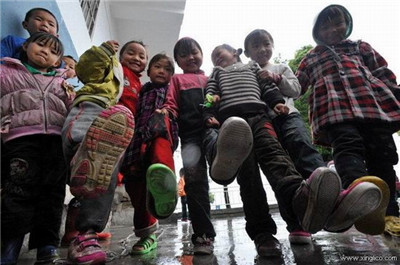(单词翻译:单击)
There are two great defining features of child-rearing today. First, children are now praised to an unprecedented degree. As Dorothy Parker once joked, American children aren’t raised; they are incited. They are given food, shelter and applause. That’s a thousand times more true today. Children are incessantly told how special they are.
如今的育儿有两大关键特征。第一,现在的孩子得到空前多的夸赞。桃乐丝·帕克(Dorothy Parker)曾经开玩笑说,美国的孩子不是抚养大的,是激励大的。他们得到了饮食、庇护与喝彩。这话在今天更是无比正确。人们不断对孩子说他们如何如何特别。

The second defining feature is that children are honed to an unprecedented degree. The meritocracy is more competitive than ever before. Parents are more anxious about their kids getting into good colleges and onto good career paths. Parents spend much more time than in past generations investing in their children’s skills and résumés and driving them to practices and rehearsals.
第二个关键特征是孩子受到了前所未有的锻造磨砺。在精英体制下,竞争空前激烈。父母比以往更担心孩子能否进入优秀大学,踏上职场坦途。比起以前几代人,现在的父母会花更多的时间对孩子的技能和履历进行投入,开车送他们去训练和排练。
These two great trends — greater praise and greater honing — combine in intense ways. Children are bathed in love, but it is often directional love. Parents shower their kids with affection, but it is meritocratic affection. It is intermingled with the desire to help their children achieve worldly success.
这两大倾向——更多的夸赞和更多的磨砺——是紧密结合的。孩子沉溺在爱中,但那爱是有指向的。父母向孩子倾注无限的感情,但那是精英至上的感情。其中掺杂着帮助孩子取得世俗成功的欲望。
Very frequently it is manipulative. Parents unconsciously shape their smiles and frowns to steer their children toward behavior they think will lead to achievement. Parents glow with extra fervor when their child studies hard, practices hard, wins first place, gets into a prestigious college.
而这时常会表现为操纵欲。父母无意中用他们的微笑和皱眉作了向导,让孩子往他们认为可以通往成功的行为发展。孩子努力学习、训练、得第一名、进入名牌大学,会让父母心中充满欣喜。
This sort of love is merit based. It is not simply: I love you. It is, I love you when you stay on my balance beam. I shower you with praise and care when you’re on my beam.
这样的爱是基于价值判断的。它不是单纯的“我爱你”。它是“我爱那个在我的平衡木上不掉下来的你。只要你在上面,我会给你无尽的赞扬和体贴”。
The wolf of conditional love is lurking in these homes. The parents don’t perceive this; they feel they love their children in all circumstances. But the children often perceive things differently.
有条件的爱是一只潜伏在家中的狼。父母对此毫无知觉;他们觉得他们无论何时何地都是爱他们的孩子的。但孩子的感受却往往不是这样。
Children in such families come to feel that childhood is a performance — on the athletic field, in school and beyond. They come to feel that love is not something that they deserve because of who they intrinsically are but is something they have to earn.
在这样的家庭里,孩子会觉得童年是一场表演——在体育竞技场上,在学校里,不一而足。他们会开始认为,他们得到的爱并不是因为他们的本我,而是某种他们要争取的东西。
These children begin to assume that this merit-tangled love is the natural order of the universe. The tiny glances of approval and disapproval are built into the fabric of communication so deep that they flow under the level of awareness. But they generate enormous internal pressure, the assumption that it is necessary to behave in a certain way to be worthy of love — to be self-worthy. The shadowy presence of conditional love produces a fear, the fear that there is no utterly safe love; there is no completely secure place where young people can be utterly honest and themselves.
这些孩子开始认为,掺杂价值判断的爱是纵贯寰宇的自然秩序。那些转眼即逝的赞许或不满,是深深嵌入在交流之中的,在不知不觉中发生着。它们会引起巨大的内心压力,让孩子认定要想配得上这份爱——有自尊,自己需要按某种特定的方式行事。有条件的爱若隐若现,营造出一种恐惧,让人担心世上不存在绝对安全的爱;没有什么地方是完全可靠的,让年轻人可以尽显坦诚和自我。
On the one hand, many of the parents in these families are extremely close to their children. They communicate constantly. But the whole situation is fraught. These parents unconsciously regard their children as an arts project and insist their children go to colleges and have jobs that will give the parents status and pleasure — that will validate their effectiveness as dads and moms.
另一方面,这些家庭中的很多家长与孩子都异常亲近,他们时常交流。然而整个局面很纠结,这些家长下意识地将孩子看成是一个艺术项目,坚持让孩子去上大学,找工作,从而让父母有地位、感到愉快,因为这能印证他们作为父母卓有成效。
Meanwhile, children who are uncertain of their parents’ love develop a voracious hunger for it. This conditional love is like an acid that dissolves children’s internal criteria to make their own decisions about their own colleges, majors and careers. At key decision-points, they unconsciously imagine how their parents will react. They guide their lives by these imagined reactions and respond with hair-trigger sensitivity to any possibility of coldness or distancing.
与此同时,对于父母的爱感到不确定的孩子,也会对父母的爱产生贪婪的渴求。这种有条件的爱具有腐蚀性,会侵蚀孩子内心里对求学、专业、就业独立做出决定的标准。在关键的决策节点上,他们会下意识地想象父母如何反应。他们指导自己的人生时,会参考这些想象的反应,并以高度的敏感应对任何冷淡或疏远的可能性。
These children tell their parents those things that will elicit praise and hide the parts of their lives that won’t. Studies by Avi Assor, Guy Roth and Edward L. Deci suggest that children who receive conditional love often do better in the short run. They can be model students. But they suffer in the long run. They come to resent their parents. They are so influenced by fear that they become risk averse. They lose a sense of agency. They feel driven by internalized pressures more than by real freedom of choice. They feel less worthy as adults.
这些孩子会告诉父母那些可以赢得赞扬的事情,隐瞒自己生活中不会受到赞赏的事情。阿维·阿瑟(Avi Assor)、盖·罗斯(Guy Roth)和爱德华·L·德吉(Edward L. Deci)开展的研究显示,得到有条件的爱的孩子们从短期来看情况都不错,他们可以成为模范学生。但从长期来看,他们会厌恶自己的父母。他们在很大程度上受到恐惧的影响,以至于会变得嫌恶风险。他们失去了主动性。他们会感觉,自己受到的驱动更多是来自于内化的压力,而不是真正的选择自由。他们成年后也会感觉没那么出色。
Parents two generations ago were much more likely to say that they expected their children to be more obedient than parents today. But this desire for obedience hasn’t gone away; it’s just gone underground. Parents are less likely to demand obedience with explicit rules and lectures. But they are more likely to use love as a tool to exercise control.
两代人之前,父母们会比今天更愿意说,他们期待孩子们更听话。不过这种让孩子顺从的欲望并没有消失,只是转移到了地下。父母通过明确地订规矩,直白地教训来要求孩子顺从的做法有所减少,但是他们更倾向于用爱当做施加控制的工具。
The culture of the meritocracy is incredibly powerful. Parents desperately want happiness for their children and naturally want to steer them toward success in every way they can. But the pressures of the meritocracy can sometimes put this love on a false basis. The meritocracy is based on earned success. It is based on talent and achievement. But parental love is supposed to be oblivious to achievement. It’s meant to be an unconditional support — a gift that cannot be bought and cannot be earned. It sits outside the logic of the meritocracy, the closest humans come to grace.
精英至上的文化强大得出人意料。父母迫切地想让自己的孩子幸福,自然也就希望引导他们以各种可能的方式走向成功。然而精英主义的压力有时却会把爱放在错误的基础上。精英主义的基础是努力赢得的成功,根源于才能和成就。然而父母的爱本应该不在意成就。父母的爱理应是无条件的支持——这种馈赠既不能买来也无法赚来。这种爱置身于精英至上的逻辑之外,是人类最接近大爱的举动。


